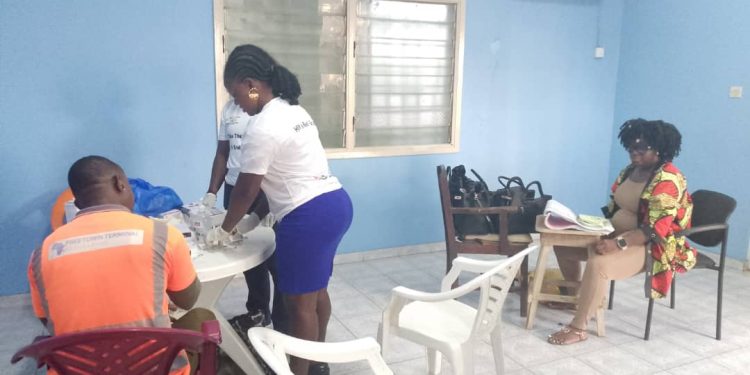Freetown Terminal Limited (FTL), a subsidiary of Africa Global Logistics (AGL), has taken a proactive step towards promoting employee welfare and public health by implementing a program aimed at encouraging its staff to know their HIV status. This initiative aligns with global efforts to combat HIV/AIDS by emphasizing awareness, prevention, and early detection as key strategies in addressing the epidemic.
In commemoration of World AIDS Day, FTL has rolled out a comprehensive initiative that provides employees with access to confidential HIV testing and counseling services. The company’s decision to prioritize employee health and well-being underscores its commitment to fostering a supportive work environment and promoting public health initiatives within the community.
The launch of this program signifies a shift towards a more holistic approach to employee welfare, recognizing the importance of addressing public health issues within the workplace setting. By offering HIV testing and counseling services, FTL aims to reduce stigma surrounding HIV/AIDS, promote healthy lifestyles, and ensure that individuals living with the virus receive the care and support they need.
Elizabeth Sia Mafinda, a representative of Freetown Terminal Limited, highlighted the company’s efforts to engage employees in HIV testing and sensitization activities as part of the initiative. She emphasized the importance of raising awareness about HIV/AIDS, providing access to testing services, and supporting affected individuals in receiving necessary treatment and care.
Mafinda noted that the company has made significant strides in ensuring that employees have the opportunity to know their HIV status through regular testing and counseling sessions. Additionally, she highlighted the availability of medications that can effectively suppress the virus for up to six months, underscoring the importance of early detection and intervention in managing HIV/AIDS.
Patrick Sannoh, Head of Health, Safety, and Environment for African Global Logistics, emphasized the significance of conducting the HIV testing program annually in conjunction with World AIDS Day. He reiterated the importance of raising awareness within the workplace and the broader society about the prevalence of HIV/AIDS and the necessity of knowing one’s status.
Sannoh stressed the company’s commitment to promoting a culture of health and well-being among its employees, noting that initiatives such as the HIV testing program are essential in creating a safe and supportive environment for all staff members. By encouraging regular testing, providing counseling services, and ensuring access to treatment options, FTL aims to empower its employees to take control of their health and seek appropriate care when needed.
The launch of the HIV testing initiative by Freetown Terminal Limited reflects a growing recognition of the role that workplaces can play in addressing public health challenges and promoting overall well-being. By prioritizing employee health and offering resources for HIV testing and support, FTL sets an example for other companies to follow in championing initiatives that benefit both employees and the broader community.
As the program gains momentum and more employees participate in HIV testing and counseling services, FTL hopes to contribute to the larger goal of combating HIV/AIDS and reducing its impact on individuals and communities. Through ongoing education, awareness-raising, and access to testing and treatment, the company is taking tangible steps towards creating a healthier and more informed workforce.
Freetown Terminal Limited’s decision to launch an HIV testing initiative as part of its commitment to employee welfare and public health marks a significant milestone in the company’s efforts to promote health and well-being within its workforce. By encouraging employees to know their HIV status, providing access to testing and support services, and raising awareness about the importance of early detection and treatment, FTL demonstrates its dedication to fostering a supportive and inclusive workplace environment.










